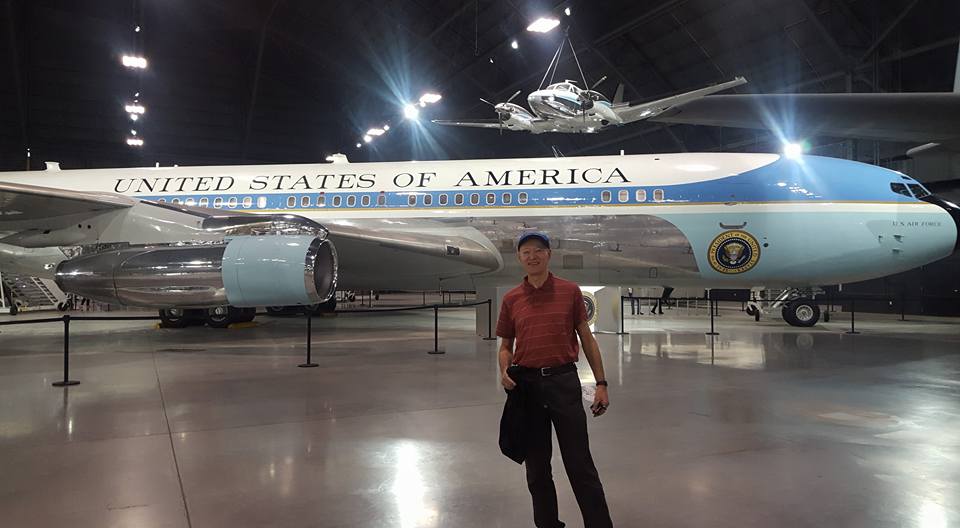- About Us
- Policy Center
- Learn
- Press Room
- Blog
- Get Involved
- Donate
- Donate to J Street Online
- Make a Gift in Someone’s Honor or Memory
- Make a Monthly Gift
- Tax-Deductible Donations
- Giving by mail
Last weekend, I visited the US Air Force Museum in Dayton, Ohio. Among the mind-boggling collection of aircraft from the birth of aviation to today was one plane I knew well – the Boeing 707 that had carried me as a member of the State Department press corps around the world in the years 1989-’95.

The plane came into service during the Eisenhower Administration when it served as Air Force One. It flew President John F. Kennedy to Dallas in November 1963 – and brought his casket back to Washington after his assassination. Lyndon Johnson was sworn in as president on that flight. Later, it was handed down for use by vice presidents and secretaries of state – which is how I got to fly on it as a Reuters State Department correspondent.
I felt as if I was looking at ghosts as I walked through the plane with the other tourists. I saw the faces of colleagues now departed this world. I saw the seat I had occupied for many tens of thousands of miles, the sofa I sat on when I interviewed Secretary James Baker, the place where the secretary and other top officials stood when they briefed the press.
In these days of fake news and a president who routinely lies to the media and the nation, perhaps it is fitting that this venerable old plane should have found a resting place in a museum. The values it embodied seem absurdly quaint, belonging to a far-off time of innocence.
In the years that I covered the State Department, the Cold War ended; Germany was reunited; the Soviet Union collapsed; apartheid ended in South Africa and the Madrid Middle East Peace Conference took place. It was a time when diplomacy reigned supreme. Secretary Baker traveled the world tirelessly, seeking to shepherd the international community through these historic changes peacefully. Baker was known for his close relationship with President George H.W. Bush, who likewise deeply believed in the power of diplomacy. If someone had told me then that our secretary of state would call the president of the United States a “moron,” I would not have believed them. If someone had said this same secretary was seen as a bulwark of reason against a president run amuck, I would have been appalled.
Of course, President Bush did deploy military power to depose the Panamanian dictator Manuel Noriega and later, more significantly, to drive Iraq out of Kuwait. In the latter instance, the United States built an unprecedented international coalition and acted with the full authority of the United Nations Security Council. When Kuwait was liberated, the United States declined to invade Iraq – which it could easily have done.
I was on the plane as Baker sought the votes he needed in the Security Council to authorize the use of force. On one occasion, we flew from Yemen to Bogota to lobby Security Council members. I remember when Baker sat down beside me and told me he had the necessary votes. But there were still more trips ahead of us – including one last-ditch trip to Geneva to meet with the Iraqi Foreign Minister in an effort to avoid the war.
Though we in the press corps knew that those who briefed us would always try to put the best spin on their information and would rarely divulge the whole picture, it never occurred to us that they would deliberately lie. Every word was carefully weighed because the president, the secretary and the entire administration knew that words had meaning and value.
Today, I am very sad to see a president who completely fails to recognize the historic role the United States has played – and should still be playing – in the world as a force for democratic values, human dignity and peace. I am sad to see a secretary of state who seems determined to gut the State Department and our ability to project soft power around the world. I am sad to see a president who makes crude threats and throws casual insult around the world as if his words mean nothing. I am sad to see this same president intimidate, belittle and bully the media, lawmakers and private citizens who dare to cross him.
The museum in Dayton reminds us of the brave men and women who gave their lives to defense of freedom in our various wars and conflicts throughout the 20th century. They died for our country – but for the freedom of many others as well. US airmen fought for Britain and France long before the United States entered World War I and World War II. They fought for the independence of Poland after the Russian Revolution.
The plane I flew on has a place of honor in that history. I pray that when President Trump’s plane eventually finds its place in the museum, his presidency will be seen as spoken of as a grave aberration in the history of our nation.